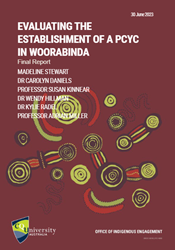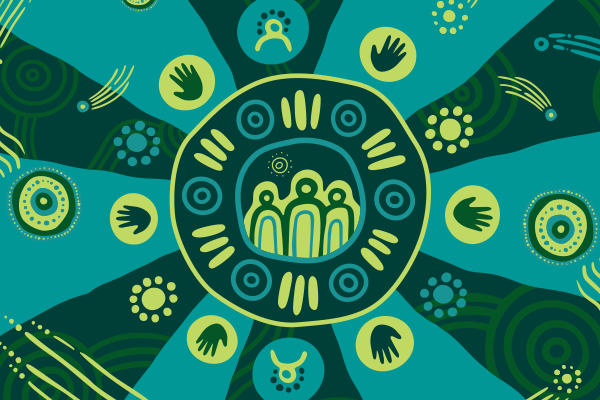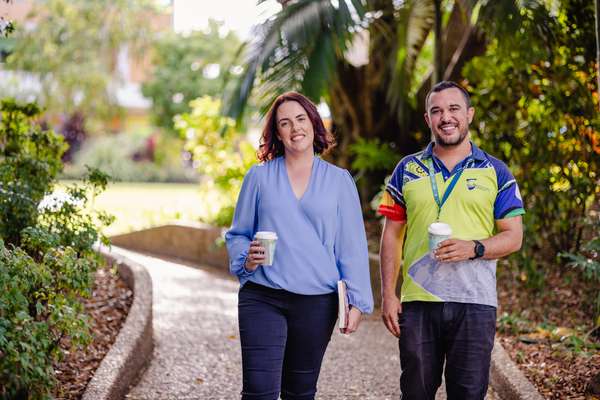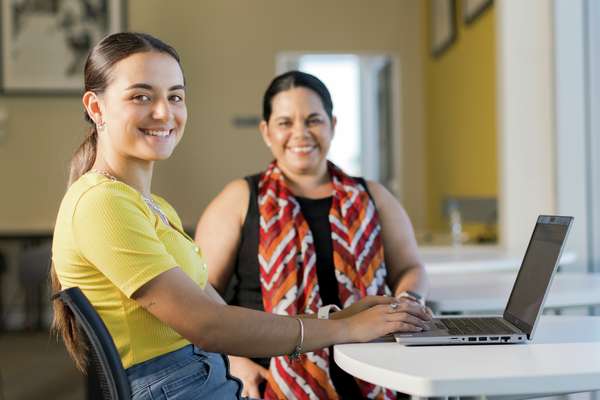To date more than 9 million dollars has been invested in under the BHP/CQU Tertiary Agreement, providing vital funds that facilitate opportunities for education, training, community-led research, and educational inclusiveness for First Nations Peoples throughout regional Queensland.
BMA funding maintains the position of BMA Chair of Indigenous Engagement; offers scholarships to undergraduate and post graduate students; provides school outreach programs and ensures research projects are developed in partnership with communities and BMA industry partners.
BMA provides scholarships through the university Scholarships program, in a commitment to Indigenous people across regional Queensland. The provision of BMA Scholarships provides eligible local First Nations students with the means to live and study, eventually contributing to their home communities. Scholarships awarded through a selection process that includes a written component to outline how the individual’s intended study focus will address the needs of regional Queensland.
Examples of the program’s success include the recent graduation of BMA Scholars who now contribute to the prosperity of regional communities across the state as teachers, occupational therapists, nurses, lawyers, medical scientists and exercise and sport scientists, paramedics, psychologists.
The BMA Chair in Indigenous Engagement role focuses on strategic planning, capacity building, engagement, and performance, to achieve better outcomes for First Nations Australians in education, training, research, and employment.
Professor Adrian Miller, Vice President Indigenous Engagement currently holds the BMA Chair position, under a five-year contract. His leadership impacts the University’s commitment to reconciliation through promotion of a sustainable culture of social equity for First Nations people and cross-cultural proficiency in staff members and in the student body.
In this role Professor Miller has to date overseen the development of CQUniversity’s Reconciliation Action Plans and First Nations Strategies, established the Jilbay Research by Higher Degree Academy and repositioned and grown the Jawun Research Institute.
He initiated the creation of the First Nations Community Engagement: Industry Guide Phase I launched in 2022. The Guide has improved First Nations community engagement for industry, organisations, and not for profit sectors benefiting both First Nations communities & sectors as its focus, with micro-credential training courses and toolkits being developed to improve multisectoral cultural capability.
Overview: The establishment of post-secondary Education/ Enterprise/Research Hubs that offer solutions for community-based education and employment challenges.
This project identifies and offers understanding of the processes required to develop and implement Community Hubs which respond to community needs and requirements to build capacity. Developing and implementing community-designed and driven Hubs requires building partnerships through collaboration with First Nations communities and key stakeholders. The research design for the project encompasses community and stakeholder engagement.
Education Hub establishment: The CQU Indigenous Student Support (ISS) team visit Woorabinda regularly to provide enrolment and education support for current and prospective higher education and VET students. The CQU Office in community provides a dedicated space for staff and students to interact effectively as well as a space for visiting researchers and CQUniversity staff.
Research Hub Establishment: The Woorabinda Research Hub is founded on five pillars that incorporate a perspective of strength and opportunity:
Project leads: Dr Kylie Radel, Dr Carolyn Daniels, Professor Adrian Miller
Project Team: Professor Adrian Miller, Dr Carolyn Daniels, Ms Madeline Stewart, Professor Susan Kinnear, Dr Kylie Radel
Project outcome: The development of this First Nations Community Engagement Guide is based on engagement processes utilised during community-led research.

Project aim: The primary aim of this Community-Led Research (CLR) Evaluating the Establishment of a PCYC in Woorabinda project was to examine the impact of the PCYC on youth behaviours in the Woorabinda community, including measurable impacts (both qualitative and quantitative) on crime rates, youth engagement, youth health and wellbeing, and community harmony.
Project lead: Ms Madeline Stewart, Dr Kylie Radel
Project Team: Ms Madeline Stewart, Dr Carolyn Daniels, Professor Susan Kinnear, Dr Wendy Hillman, Dr Kylie Radel, Professor Adrian Miller
Project Overview: This project examines the potential bioactivity of plants and remedies used in First Nations medicine and how this practice forms an element of the Woorabinda Research Hub. It offers opportunity for community-based and led research in the important field of bioactive medicine, specifically derived from First Nations knowledges of the medicinal properties of native plants and remedies. The study provides a positive starting point for the process of potential commercialisation of the plants and the remedies and the isolated derivative compounds.
Project lead: Dr Mani Naiker
Project Team: Uncle Steve Kemp, Prof Adrian Miller, Dr Padraig Strappe, Assoc Prof. Paul Nielsen, Dr Jason Steel and Prof Kerry Walsh
Outcomes for Australia: Project outcomes will include a detailed and specific understanding of community preparedness, concerns and strategies for addressing COVID-19, and the amplification and incorporation of local solutions into communication and health promotion material for COVID-19.
Project Team: Prof Adrian Miller, Assoc Prof Peter Massey, Miss Kristy Crooks
Collaborators: Prof Jenni Judd, Dr Jenny Kelly
Objectives:
COVID-19 Read about other COVID-19 projects funded by the National Health and Medical Research Council.
Operating in a strong, cultural, and united way, we provide leadership to improve higher education outcomes for First Nations People.

Discover the research being undertaken through our collaborations and across our research academies

Find a wide range of scholarships to help with the cost of study, specifically for current and future First Nations students.

CQUniversity Australia is a trading name of Central Queensland University
ABN: 39 181 103 288
RTO Code: 40939
CRICOS: 00219C
TEQSA: PRV12073